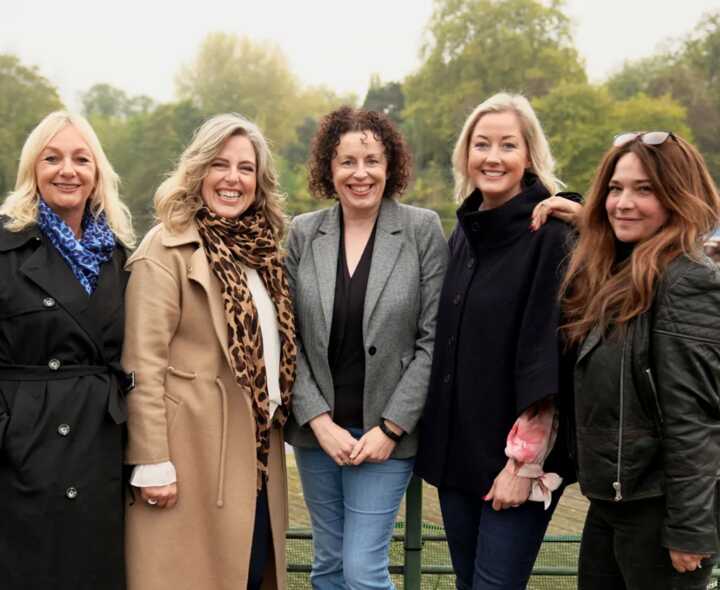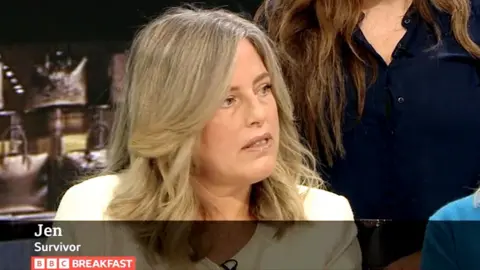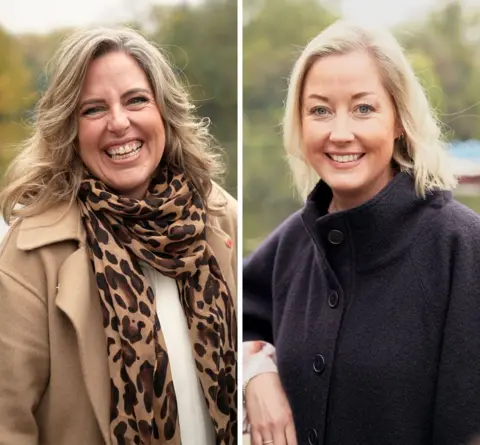
Minutes before five women, who had been sexually abused by Mohamed Al Fayed, were due to appear on live TV, one of the group was vomiting in the studio toilets.
It would be Jen’s first time speaking about her experiences without the shield of anonymity - and she was terrified.
“I couldn’t eat that morning,” she recalls of the interview with BBC Breakfast at the end of September.
“I wasn’t very well practised at that point at telling my story and finding words. So I had a very physical reaction.”
About a week earlier, all five women’s stories had been featured in a BBC documentary, Al Fayed: Predator at Harrods. The programme uncovered decades of abuse perpetrated by the billionaire and former Harrods owner, who died last year at the age of 94.
Jen was the only one of those five women appearing on the Breakfast sofa not to have agreed to reveal her identity in the documentary. She had been given the pseudonym “Alice”, and her voice had been distorted.

“One of the things [my counsellor] said to me before I fully decided to tell my story face-to-camera was that when you do that, you lose control of your story - because all of a sudden it’s not yours anymore,” Jen says. “It’s out in the world, you can’t really control who knows it, what they think, what their reactions are.
“I was terrified of that, because I felt so ashamed of what happened.”
But Jen, who worked as Al Fayed’s personal assistant for five years from 1986 to 1991, didn’t realise then that the four other women sitting next to her on the red sofa - all survivors of Al Fayed’s abuse - would become friends.
All five - Jen, Lindsay, Nicole, Katherine and Gemma - had worked for Al Fayed. Some aspects of their experiences differ, others are disturbingly similar. As they took turns recalling their abuse on the programme, they felt vulnerable.
Seven weeks on from their live TV interview, laughing together on a mild autumn day in London’s Battersea Park, they are unrecognisable. BBC Breakfast is meeting them again to hear about how they’ve been supporting each other.
“The camaraderie that we’ve built between us now has really given us a lot of empowerment,” Lindsay says. “I just don’t think that we would be this far along in our recovery had we not got each other.”
Lindsay worked as Al Fayed’s personal assistant for five months between 1989 and 1990. She says he sexually harassed her, assaulted her on a daily basis, and then trafficked her to Paris, where he attempted to rape her.
She says that after the documentary aired in September, the women set up a group chat on the messaging app Signal, named “Stronger Together”.
“We draw strength from that [group],” Lindsay says. “If we’ve got any worries, we put it on there and everyone’s got your back. I’m feeling much stronger because we’re part of a whole collective of fabulous, strong women.”
But this is more than a new friendship. Though many of the women only met two months ago, their shared trauma means their bond has deep roots - ones that Jen says will last “probably for the rest of our lives”.
“No one in this world can understand what we’ve been through and the impact it’s had, other than these women and the other women in the group,” says Gemma, who worked for Al Fayed as one of his personal assistants between 2007 and 2009.
She says she became increasingly frightened of Al Fayed during work trips abroad, and was raped by him in Paris.
“It’s almost like the unsaid - you don’t have to say. You just know what each other’s thinking.”
This means that while they have to describe their abuse for the public, there’s no need to “keep reliving the past” with each other.
“There are certain stories that I could never tell my school friends or my family - they just wouldn’t believe me,” Gemma says.

Many of the women hadn’t told their families about the abuse before they agreed to take part in the film. Jen told her family shortly before going on BBC Breakfast.
But it wasn’t just their families they felt they had to keep it from. Survivors have described female staff at Harrods being deliberately isolated from each other.
Jen explains that she and Lindsay worked in the same office at the same time, but “barely spoke to one another, because that’s how things were in the office”.
“We weren’t really allowed to be friends with one another, and we certainly weren’t allowed to confide in one another,” she said.
These years of isolation have made the women’s new-found connection particularly special. Nicole says the idea of them speaking regularly, forming close friendships and supporting each other would make Al Fayed “absolutely incandescent with rage” if he were alive to see it.
Nicole worked as Al Fayed’s executive assistant between 2005 and 2007, when she was in her 30s. She experienced daily sexual harassment and assault from him.
“We weren’t allowed to talk to each other. We weren’t allowed to share things. We weren’t allowed to share experiences. We weren’t allowed to become friends,” she adds. “He created that environment purposely so that he could get away with doing what he wanted.
“So yeah, he’d be enraged. And I think that’s fantastic.”
Katherine, who was sexually harassed while working as a senior personal assistant for Harrods in 2005, says many women were, understandably, “too scared to come forward” while the documentary was being made.
But this group of women are trailblazers. Since they first spoke out about their experiences, more than 70 women have contacted the BBC with accounts of abuse by Al Fayed, including sexual harassment, sexual assault and rape.
For Jen, waiving her anonymity on BBC Breakfast two months ago was excruciating in the moment. But the weeks since have felt like a renewal.
“When I’m talking about my life at Harrods, I feel kind of like that happened to somebody else, because it’s something that I’d put in a box and hadn’t talked about with anybody for 35 years,” she says.
“Taking the lid off that box and really examining the contents again made me feel very close to that person, like I was that 16-year-old girl all over again.
“But when I think about how I felt sitting on the sofa six weeks ago, I feel completely different now. I feel stronger, I feel more confident. I feel like I don’t need to feel ashamed.”
Additional reporting by Ellie Price
Read more similar news:
Comments:
comments powered by Disqus

































